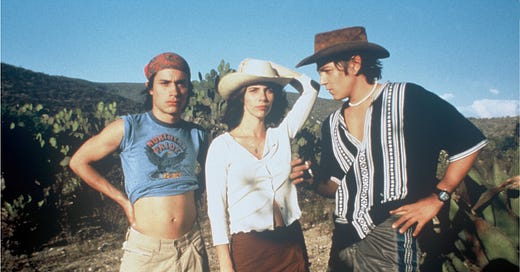Last week, I wrote about Y tu mamá también right at the end of my newsletter, but the truth is I hadn’t finished watching it yet. I finished the movie later that day and cried harder than I’ve cried for a work of art in a long time. The image I found most heartbreaking haunted me for days, especially as I lay in bed trying to sleep. The haunting wasn’t unpleasant, though. It was wonderful, actually, to feel so overtaken.
While I love emotion in literature, I’m more avoidant with films and TV (even music) because the feeling of having my senses taken over is too intense. I won’t watch scary or violent movies, and psychological suspense is even too much for me to watch by myself. This means I usually default to light comedies or reality shows like Love Is Blind, where there’s no chance I’ll feel too much. They still have their depth (I’ve loved writing about shows like Terrace House or The Baby-Sitters Club), but they don’t overwhelm me.
Watching Y tu mamá también and remembering that feeling of being haunted by a work of art excited me so much, I dug through friends’ recommendations and asked Evan to help me decide what to watch next. Past Lives was on my list (because I’m doing an artist’s residency next month and a friend asked, “Will it be like Past Lives?”), so Evan helped me create a bridge: Challengers, which like Y tu mamá también has a threesome scene and which was written by Justin Kuritzkes, the husband of Celine Song, who wrote and directed Past Lives.
Watching Challengers, at first I felt resentful—resentful about stepping out of the world of Y tu mamá también, which I loved, and into a new world, which I chose to step into but was colder and more sparse. I reminded myself then of Aya, who wants to hear the same song over and over and protests each new song, which usually she ends up loving as much as the one that came before.
Which approach is right, for each of us, and at which time? I wondered. The answer isn’t always the same. I could take inspiration from Aya and watch the movie I loved again, probably noticing something new each time. When is the last time I’ve behaved like a little kid that way, being honest about my desire to stay in the world of a movie or book or song I love long enough to map the terrain, commit it to memory? Is that what she is doing?
This time, I’m trying to notice my discomfort and push through it. The films are only practice, since it doesn’t matter to anyone besides me whether I finished watching Challengers. (I did! It was fun and silly. I didn’t expect it to haunt me, but it did — the final scene that perfectly mirrored the final scene of Ponyo. What does that mean? Maybe nothing, but the connection sparks in my brain, providing some source of life.)
I am practicing stepping between worlds, holding multiple moods — writing this newsletter, sharing photos of the clothes I knit, going to protests and baby-and-me classes, weaving together parts of my life I classify as “serious” and “silly.” Being artist or mother, writer or knitter. I am trying to make space for all of it, to approach a kind of wholeness, to let myself be the way I am without creating some unifying narrative for it. I want Aya to know she doesn’t have to work to be legible to anyone else, the way I’ve done for years and still feel the pressure to do. The narrative is the process, revealing itself in real time.
Journaling prompt:
What would you do if you didn’t need to make sense to anyone?


